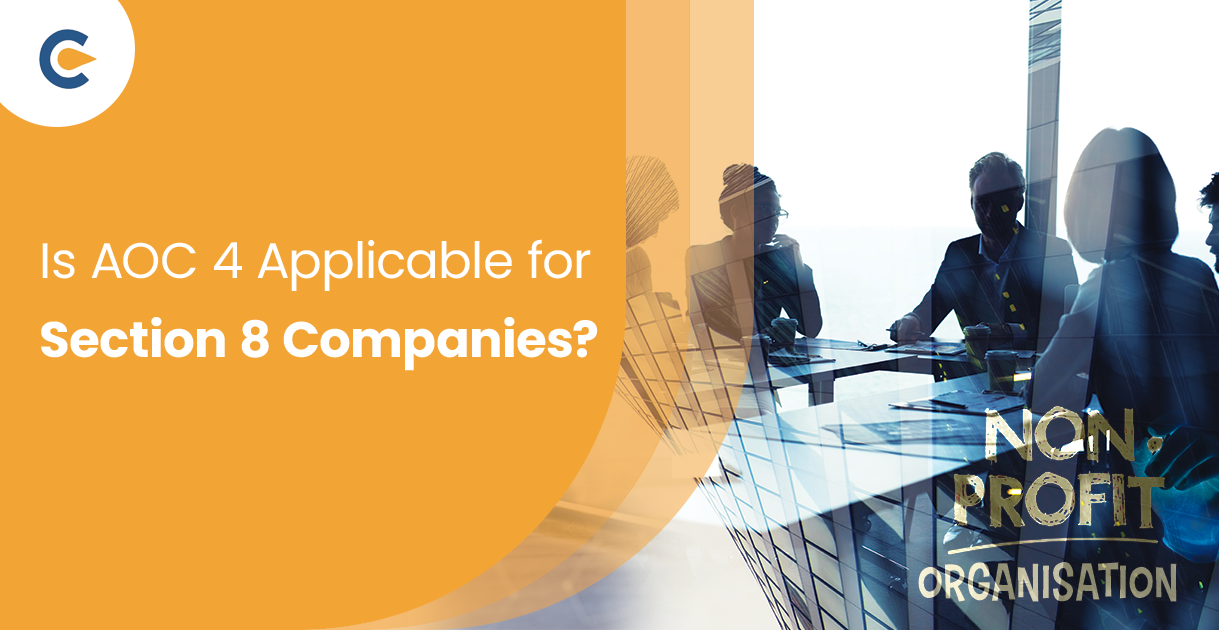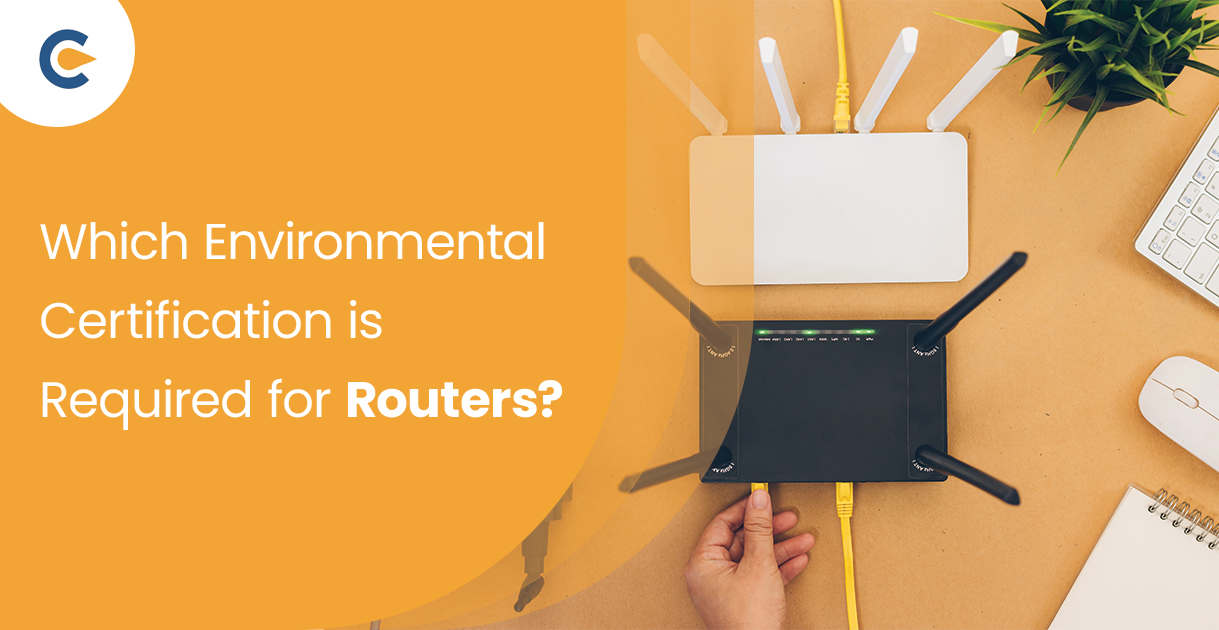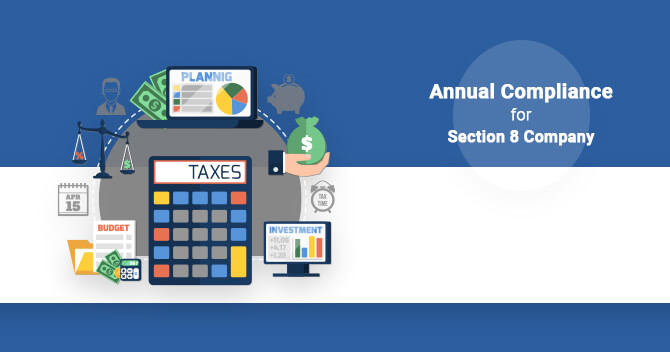Under the Companies Act of 2013, a Section 8 company in India is a nonprofit organisation that advances social welfare. Like other businesses, Section 8 companies must comply with specific regulations.
These organisations are committed to social issues and operate as nonprofits, yet they still have legal requirements to follow. Discover all there is to know about nonprofit organisations (NPOs) and the yearly compliance requirements they must meet by reading this article, which focuses on AOC 4, which applies to Section 8 corporations.
Explore and learn about the steps that must be taken to file an AOC 4 for these entities. In this post, we will discuss AOC 4 Applicable for Section 8 Companies.
Let’s read it out:
A Brief Take on Section 8 Company
In India, a Section 8 company is a unique nonprofit entity recognised by the Companies Act of 2013. Social welfare, the arts, business, education, charitable giving, sports, science, and research are all encouraged.
In contrast to ordinary for-profit companies, Section 8 corporations do not pay dividends from their revenues; instead, they use their income and profits to further their goals. Because they are nonprofit organisations, these businesses are prohibited from using “Limited” in their names.
Under the Income Tax Act and other laws, Section 8 firms frequently benefit from specific exclusions and advantages. However, companies under Section 8 must comply with the same regulations as other businesses.
Section 8 Compliance
“Section 8 compliance” describes the legal and regulatory requirements that Section 8 Companies in India must meet to preserve their nonprofit status and comply with the Companies Act 2013’s rules.
Registered Section 8 Companies must meet compliance needs. Corporations, particularly Section 8, must comply with various standards that change depending on several factors. These compliances can be grouped into the following categories for a more precise understanding:
- Event-Based Compliances: These are brought on by particular incidents or events within the business.
- Time-Based Compliance: These are periodic, recurring compliances that need to be completed annually, half-yearly, or quarterly.
- Particular Criteria-Based Compliance: Certain compliances are necessary based on certain requirements, such as the company’s paid-up share capital, turnover, or other circumstances.
All You Need to Understand about AOC 4
Companies in India are required to file the AOC 4 form, as mandated by the Companies Act 2013, with the Registrar of Companies (ROC) to submit their financial statements and other relevant documentation. This form ensures stakeholders, regulatory agencies, and the general public can easily access and understand a company’s financial health.
Importance of Filing AOC 4
Financial statements are formal records of a Company’s financial operations and standing. They give investors and shareholders access to a company’s actual financial situation.
Financial statements are primarily intended to inform a variety of stakeholders—including those involved in corporate decision-making—about the condition, evolution, and changes in a company’s financial position.
The primary channel of communication between the Board of Directors and its shareholders is the yearly financial statements that are compiled and submitted. Financial statements, which include the Board’s Report and the Auditor’s Report, are required to be disclosed to inform the public and shareholders about the company’s financial situation and operations.
Financial statements benefit all stakeholders, investors, and financial institutions by giving a clear picture of the company’s financial situation and aiding in decision-making.
Whether AOC 4 Applicable for Section 8 Companies or Not
NPO money must be used for charitable purposes instead of dividends to the organisation’s shareholders. These companies must obtain a certificate of formation from the federal government and adhere to all government regulations.
According to the regulations, if the requirements outlined therein are not fulfilled, the NPO may be closed at the Central Government’s request. In addition, if the company’s objectives prove untrue, severe legal action will be taken against each member.
Every Section 8 company must fulfil the annual compliance criteria specified by the Income Tax Act of 1961 and the Companies Act of 2013. By doing this, the company avoids penalties for noncompliance while retaining its credibility and dependability. Compliance tasks need to be accomplished all year long and may be laborious. AOC 4 is applicable for Section 8 Companies.
Benefits of Yearly Compliance for Section 8 Corporations
Adhering to regulations consistently enhances the Section 8 Company’s credibility and dependability. It facilitates Section 8 Companies’ fundraising efforts for nonprofit organisations. Moreover, the regular submission of yearly returns guarantees the organisation’s ongoing existence.
Following compliance guidelines and meeting yearly compliance requirements can shield the company from legal issues. It also helps the Section 8 firm defend against accusations and penalties.
Establishing and maintaining customer confidence is the main goal of a Section 8 enterprise, and timely submission of annual returns helps the business achieve this goal.
Annual Compliances One Must Know
A Section 8 corporation must comply with the income tax and Registrar of Companies (ROC) requirements. If these organisations and their directors don’t meet their compliance obligations, they risk incurring high fines and maybe losing their director status for a while.
Appointment of an Auditor:
Section 139 of the Companies Act 2013 requires companies to designate an auditor. The statutory auditor, appointed for five years, will audit the company’s book of accounts and annual returns. Upkeep of Statutory Registers: Section 8 of the Companies Act of 2013 requires the company to keep a statutory register listing its directors, members, loans obtained, and charges created.
Convening Meeting:
Other board meetings must be held in addition to the once-yearly annual general body meeting, which must occur within six months after the conclusion of the fiscal year.
Report of the Boards:
The company’s board of directors must file their report, which includes all financial statements and additional appendices, in a suitable manner. Form AOC 4 must be used to file the board report.
Making the Company’s Financial Statements:
The statutory auditor will provide the company with an audited copy of the cash flow statement, balance sheet, profit and loss statement, and other financial statements that need to be filed with ROC.
Tax Returns:
Every assessment year, the ITR must be submitted by September 30th at the latest.
Financial Statement Submission:
The financial statements must be submitted in the proper format (E-FORM AOC 4) within 30 days following the date of the annual general meeting.
Filing Annual Returns:
Within 60 days of the annual return, the annual general meeting, which includes all the information, such as management and shareholder details, must be filed in Form MGT-7 with the Registrar of Companies (ROC).
Keeping Up with Statutory Registers:
Statutory records must be kept current in each Section 8 Company’s register. These documents provide information about members, loans, investments, fees, etc. Additionally, they offer a broad summary of the business’s yearly operational effectiveness. From the comfort of your own home, the team of experts at Company Suggestion is here to help you every step of the way.
Tasks for Annual Compliance
All of the required elements in the compliance package are part of the annual compliance obligations for Section 8 Companies.
- Auditor Requirement: All corporations are required to hire an auditor under Section 139 of the Corporations Act of 2013.
- Maintenance of Register: By Section 8 of the 2013 Companies Act, the business must keep a statutory register that includes information on its members, loans it has taken out, fees it has set, and other relevant facts.
- Conducting Meetings: The organisation must plan other mandatory statutory meetings besides the annual general meeting.
- Annual Report: The company’s directors must provide a yearly report that includes financial details and an analysis of its corporate social responsibility. The board of directors oversees this, and Company Suggestions is prepared to help.
- The company’s financial statement: The financial records from the previous fiscal year, including the cash flow statement, profit and loss statement, and other economic data, must be officially submitted.
Financial Statements Submission (AOC 4 for Section 8 Companies)
A copy of each Section 8 Company’s accounting records must be submitted in the required format (e-form AOC 4). They have thirty days from the most recent annual general meeting to comply.
Company recommendation is an expert in helping Section 8 businesses complete forms and annual reports accurately, ensuring that all data given on government and ministry websites is appropriate.
Total Meetings and Quorum for the Board
As per the exemption notifications and the provisions outlined in sections 173(1) and 174(1), corporations operating under Section 8 must conduct at least one meeting every six months. A quorum of eight directors or one-fourth of the total shareholder count, whichever is fewer, is necessary for board meetings. It is important to note that the quorum must include at least two individuals.
MGT-7, Annual Returns Filing with ROC
Companies operating under Section 8 must also provide Form MGT-7 to the Registrar of Companies (ROC) to fulfil their obligation of submitting the company’s annual returns. This requirement arises from their status as limited companies. Within sixty days following the latest annual general meeting, the submission of Form MGT-7 becomes necessary.
Penalties for Non-compliance
Noncompliance with requirements may result in jail, fines between ₹25,000 and ₹500,000, and the company and its executives being placed on a temporary blocklist.
If any of the following protocols are not followed, the Ministry of Corporate Affairs (MCA) has the authority to levy the following financial penalties:
If discovered to be at fault, chiefs and all other Organisation officials could be subject to up to ₹25 lakhs in penalties and jail. This outcome occurs if the organisation’s issues are purposefully misrepresented. The Central Government can revoke the organisation’s permit if it operates incorrectly or against its stated objectives.
Conclusion
The annual compliance requirements for Section 8 enterprises serve as both a means of leveraging the benefits connected with their status and a legal requirement.
By carefully adhering to these requirements and avoiding severe noncompliance fines, Section 8 enterprises can preserve their operations and contribute to their specific societal purposes. After reading this post, we hope you understand whether AOC 4 is applicable for Section 8 Companies.
Frequently Asked Questions
Is AOC 4 applicable for Section 8 companies?
The AOC 4 Form requires Section 8 companies to file yearly financial statements.
Does the Section 8 Company operate as a nonprofit?
Indeed, Section 8 corporations are nonprofit entities established to further social welfare, environmental conservation, business, and the arts.
Which business must submit an AOC 4?
Nonprofit organisations, sometimes called Section 8 corporations, must submit the AOC 4 Form on time, which is an annual compliance requirement. Compliance with this filing requirement ensures transparency and accountability in the financial reporting of Section 8 companies.
What is an AOC 4 Form?
An AOC Form is the document with which a company files its financial statements on an annual basis for each fiscal year with the Registrar of Companies (ROC).
All attachments and financial statements are uploaded together with the e-AOC 4 Form. Per the Companies Act of 2013 guidelines, the paperwork and financial accounts must be signed appropriately.Does the Section 8 Company's noncompliance carry any penalties?
According to Section 8 Company, there are fines for noncompliance; if you don't follow the rules, you risk paying up to 25 lakhs or going to jail.
What occurs if an AOC 4 is not submitted?
A Section 8 company that fails to file the AOC 4 Form may face fines and other legal repercussions, such as director disqualification. The AOC 4 Form must be submitted on time for financial reporting to remain compliant and transparent.
When is the deadline for Section 8 Company AOC 4 filings?
Within thirty days of the date of the annual general meeting (AGM) where the financial accounts are adopted, Section 8 firms are required to file AOC 4.
Are Section 8 Companies subject to any particular considerations?
Yes, Section 8 firms must ensure that their operations' nonprofit nature is reflected in their financial records. The income and expenditure statement replaces the profit and loss account customary for other businesses.
Read our article: Annual ROC Filings And Requirements For Section 8 Companies











